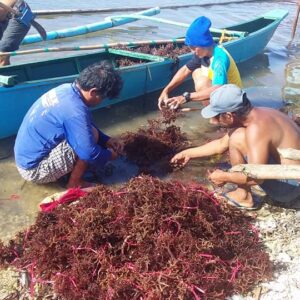
BATANGAS, PHILIPPINES – Families in the coastal barangays of Calatagan, Batangas have always relied on the sea for sustenance. Families’ incomes are dependent on fishing and seaweed farming.
Seaweed farming started in Calatagan in the 1980s through a project of the UP Marine Science Institute (UP MSI). When the project ended, a couple with their extended families continued planting seaweeds and were able to sell 10 tons of dried seaweeds, earning Php100,000 (USD 2080). Planting seaweeds was then seen as a viable income-earning activity in the community. The 1990s saw an increase in the number of families planting seaweeds. The dried seaweeds also started selling for double the price, and families also started to mark their “territories” for seaweed farming.
In 2000, the seaweed farmers and their families decided to establish the Batangas Seaweed Farmers Association (BASEFA) with the help of the municipal government and the Provincial Cooperative Development Office. BASEFA covers four barangays in Calatagan and currently has a total of 18 hectares of seaweed farm and 90 individual members. The organization also acts as a consolidator for its members. It looks for buyers of seaweeds, makes logistical arrangements, and negotiates the price. This also means that there are no traders involved, increasing profit for the organization and its members.
In 2015, BASEFA became a member organization of Samahan ng Artisano Mangingisda at Magsasaka ng Calatagan (SAMMACA; subnational farmer organization) and Pambansang Katipunan ng mga Samahan sa Kanayunan (PKSK; national farmer organization).
One of the most significant contributions of PKSK and SAMMACA to BASEFA under the AFOSP-MTCP2 was the support they extended in addressing natural and man-made disasters that BASEFA encountered. Since 2015, BASEFA members have been reeling from the damage made by a Taiwanese aquaculture company occupying five (5) hectares in their community. The company breeds P. Vannamei or pacific white shrimp and releases polluted water to the sea. This has severely affected the seaweed farms of BASEFA members. The seaweed farmers described the seaweeds as “natunaw” (disintegrated) with almost nothing left, and “nabansot” (stunted) for those that survived. With the assistance of SAMMACA and PKSK, BASEFA submitted petitions to the local government of Calatagan, Municipal Agriculture Office, Department of Environment and Natural Resources (DENR) Regional Office, and Environmental Management Bureau (EMB). SAMMACA and PKSK mentored and extended political and campaign support to BASEFA leaders in every step of the struggle. PKSK continuously helped in monitoring the status of the issue and facilitated a dialogue with the municipalities of Balayan and Calatagan. It also organized a round table discussion regarding the situation of seaweed farming in the area. BASEFA was also part of the organizational strengthening and capacity building activities given by PKSK. Both forms of political and organizational support further strengthened linkages and networks that BASEFA has established with local government.
In March 2019, the DENR Regional Office ordered the closure of the Taiwanese aquaculture company by April of the same year. As of August 2019, the company is still operating even without a permit because it asked to finish harvest for the year. Meanwhile, seaweeds can grow properly for as long as the company does not release polluted water.
Aside from production being affected by water pollution from the aquaculture company, the coastal areas of Calatagan were also affected by Typhoon Nina (Nock-Ten) in December 2016. Tropical Cyclone Warning Signal No. 3 was issued for Calatagan. Damages identified by PKSK for BASEFA areas amounted to PHP130,000.00. The following year, Tropical Depressions Maring (Doksuri) and Salome (Haikui) both hit the same area in September and November respectively, causing damage to some portions of the seaweed farms.
PKSK, through AFOSP-MTCP2, also extended economic support to BASEFA in terms of capacity building (financial management) and providing seed capital to rehabilitate the seaweed farms that were damaged because of the water pollution from the aquaculture farm and typhoons that followed. The seed capital of PHP 50,000 (USD 1040) was used to buy one ton of seedlings and farm implements. A nursery for the seaweed propagules or seedlings composed of 20 rafts was constructed. Seedlings from the nursery were given to 32 members in Barangay Poblacion Dos. Upon harvest, the initial 32 members set aside new seedlings so that the other members in other areas will also be able to benefit from the seed capital. Between September 2018 and March 2019, BASEFA was able to harvest 10 metric tons of seaweed and was able to sell these at PHP 70 (USD 1.5) per kilo. Members of BASEFA returned the equal number of seedlings given to them in the form of dried seaweeds. BASEFA has PHP 50,000 worth of dried seaweeds which it needs to sell so that it can return the seed capital to PKSK.
Aside from being able to recover from disaster, BASEFA, under AFOSP-MTCP2, has also sustained its strong ties with different local government bodies and government agencies. It is a member of the Municipal Fisheries and Aquatic Resources Management Council (MFARMC), Municipal Development Council (MDC), and is recognized and has been the recipient of projects by the local government of Calatagan, the provincial government of Batangas, Bureau of Fisheries and Aquatic Resources (BFAR), Department of Agriculture (DA), and Department of Science and Technology (DOST).




Comments are closed